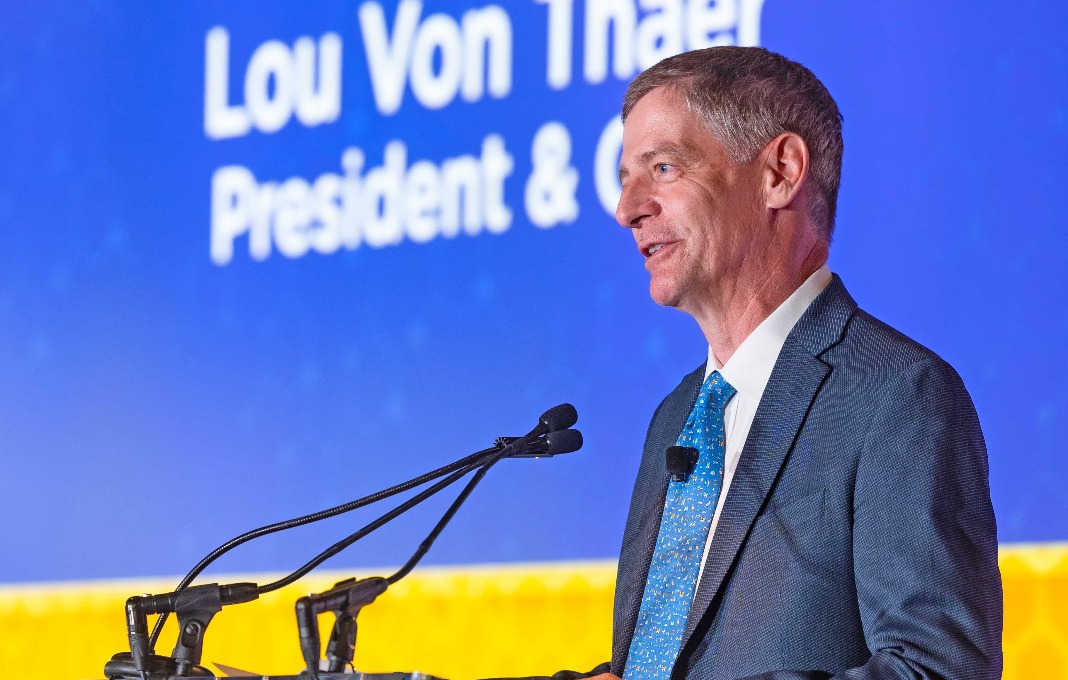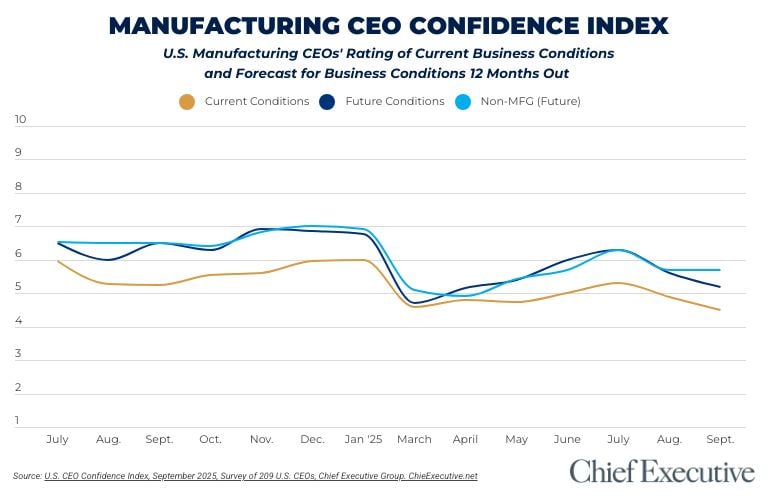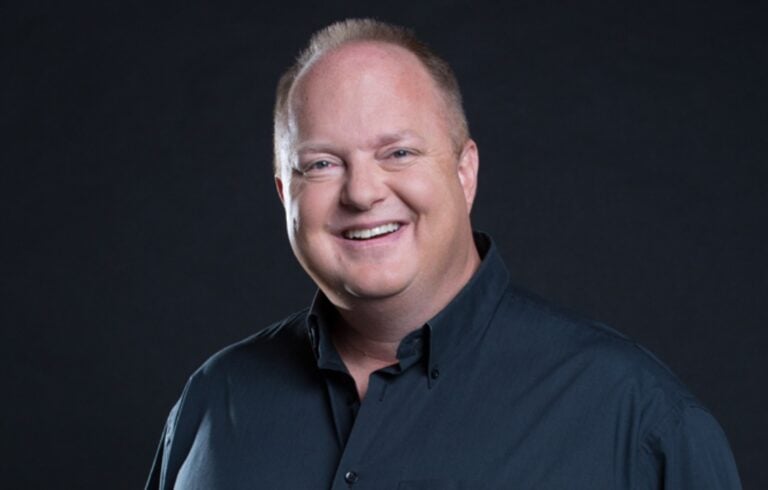


For American manufacturers, Battelle is one of the most important nonprofit institutions in the world, the 95-year-old home of one of the country’s most significant concentrations of applied science and technology and creator or developer of scores of commercially significant innovations including submarine fuel rods, the Xerox photocopier, CD ROMs, bar-scan codes, drug-delivery technologies, the Neurolife neural bypass system—as well as the lining of aluminum soda cans and the dimples on golf balls.
So it’s instructive for manufacturing chiefs to understand what Lewis Von Thaer, president and CEO of what historically has been known as the Battelle Memorial Institute, is thinking about key industrial technologies, about government policy relevant to manufacturing, and about the future of the American economy.
“Companies come to us trying to solve a problem,” Von Thaer told Chief Executive from Battelle headquarters in Columbus, Ohio. “We’ve got chemists, biologists, materials experts — we’re a bunch of PhDs, scientists and engineers, who are available to industrial and research companies to look at processes and materials issues they’re having, and flow issues.
“Typically, by the time companies [and government agencies] come to us, they’ve tried to fix an issue for a long time, and it’s a difficult problem. When we get involved, we can be helpful. Then we tend to be whitelisted and let the companies take all the glory.”
One recent pressing issue for Battelle has been PFAS, the “forever” chemicals that have become one of the world’s biggest environmental issues—and a major headache for legacy manufacturers of non-stick cookware, firefighting foam and other products that incorporate them.
“Several years ago, our researchers told us this is a carcinogen, is causing problems and will result in regulation,” Von Thaer says. “What jumped to my mind was asbestos. But asbestos sits where you put it; PFAS is the strongest bond in nature, and hard to destroy, and it’s feeding into our groundwater supplies.”
Battelle got to work and came up with an “annihilator” technology for PFAS which has spawned a Columbus-based startup, Revive Environmental, as well. It’s one of a handful of commercial spinouts Battelle has birthed in the last four years, a roster that also includes Gingko Bioworks, a biotech company in Boston hatched by MIT, and Ohio-based AmplifyBio, which has developed ways to reduce drug-testing times for clinical approvals.
Von Thaer has been president and CEO of Battelle since 2017, after moving up a technology-focused career ladder that has included stings at AT&T Bell Laboratories, General Dynamics, Leidos and, most recently, DynCorp International where he was CEO. He’s also on the board of Columbus-based utility giant American Electric Power.
Here are Von Thaer’s views on some important matters for manufacturing CEOs, at the intersection of technology, business and the economy:
Industrial policy. “In general I tend to be a hard-nosed capitalist,” Von Thaer said. “Governments have a tough time of demonstrating expertise over [what] the market does. The market can be brutal, but governments hang on for a long time.
“But I do think that in certain issues, such as deep national-security concerns, I’m a big fan” of industrial policy such as what the Biden administration has put together recently. “For example, with semiconductors, there were no advanced chips being built in this country [so] I was one of the supporters of doing something to get chip-making and a handful of critical technologies more controlled from a national-security and economic standpoint.”
Von Thaer is undaunted by delays that Intel recently announced in construction of its planned massive chipmaking complex in central Ohio, even though experts cited the nearby presence of Battelle and Ohio State University — with their vast bases of technological understanding and talent — as a major factor in Intel’s decision to put the $20-billion project where it plans.
“A year or two delay in a project of that size and scope isn’t unusual,” he says. “A little bit of that is [Intel’s] signaling to the administration and markets.”
Electric vehicles. “It’s harder to talk about that” than semiconductors “as a national-security issue,” Von Thaer says. “It’s more of an environmental issue.”
As far as automakers are concerned, he says, “I would have done it a little bit differently. Personally, I bought a hybrid: It’s got a battery one-tenth of what goes into full-electric EVs. That’s a case where government subsidies ultimately are influencing the market. But the actual market desires of people buying will ultimately decide how long these transactions take.”
Advanced technologies. Battelle has been helping the federal government set up some of the series of R&D hubs it has been establishing for the last several years around key advanced technologies, such as hydrogen power in the Midwest and direct carbon capture in the Southeast—and a next-gen semiconductor hub in Ohio.
“The last two administrations really have been a boon to R&D in this country with investments in these areas,” Von Thaer says. “But we’re focused on trying to prepare for the next [economic] cycle, because I can see a time where, with the national debt, this [emphasis] is going to have to shift to buy missiles and munitions. At some point that will drive us to a little different [federal] spending pattern.”
Climate change. Battelle personnel have been involved for some time in helping generate and analyze the data by which scientists are assessing and predicting the course of the climate, including operating an infrastructure that gathers climate information in the Arctic. Von Thaer has the institute involved in the big picture as well, hosting a conference on climate resilience.
“How can we be more green, balancing that with the fact that we’re not going to hit most of the goals of the Paris [climate] accords,” he says. “It’s difficult when rich countries go all out on this, but if you’re cold and hungry, climate change is a very abstract concept—and you burn coal.”




Chief Executive Group exists to improve the performance of U.S. CEOs, senior executives and public-company directors, helping you grow your companies, build your communities and strengthen society. Learn more at chiefexecutivegroup.com.
0

1:00 - 5:00 pm
Over 70% of Executives Surveyed Agree: Many Strategic Planning Efforts Lack Systematic Approach Tips for Enhancing Your Strategic Planning Process
Executives expressed frustration with their current strategic planning process. Issues include:
Steve Rutan and Denise Harrison have put together an afternoon workshop that will provide the tools you need to address these concerns. They have worked with hundreds of executives to develop a systematic approach that will enable your team to make better decisions during strategic planning. Steve and Denise will walk you through exercises for prioritizing your lists and steps that will reset and reinvigorate your process. This will be a hands-on workshop that will enable you to think about your business as you use the tools that are being presented. If you are ready for a Strategic Planning tune-up, select this workshop in your registration form. The additional fee of $695 will be added to your total.

2:00 - 5:00 pm
Female leaders face the same issues all leaders do, but they often face additional challenges too. In this peer session, we will facilitate a discussion of best practices and how to overcome common barriers to help women leaders be more effective within and outside their organizations.
Limited space available.

10:30 - 5:00 pm
General’s Retreat at Hermitage Golf Course
Sponsored by UBS
General’s Retreat, built in 1986 with architect Gary Roger Baird, has been voted the “Best Golf Course in Nashville” and is a “must play” when visiting the Nashville, Tennessee area. With the beautiful setting along the Cumberland River, golfers of all capabilities will thoroughly enjoy the golf, scenery and hospitality.
The golf outing fee includes transportation to and from the hotel, greens/cart fees, use of practice facilities, and boxed lunch. The bus will leave the hotel at 10:30 am for a noon shotgun start and return to the hotel after the cocktail reception following the completion of the round.